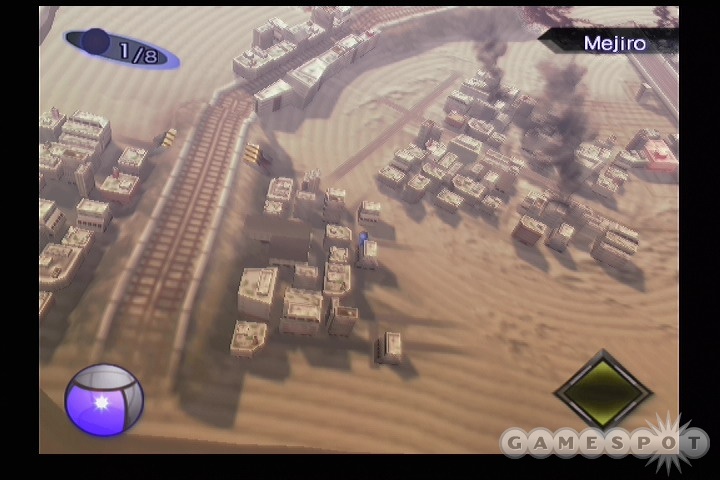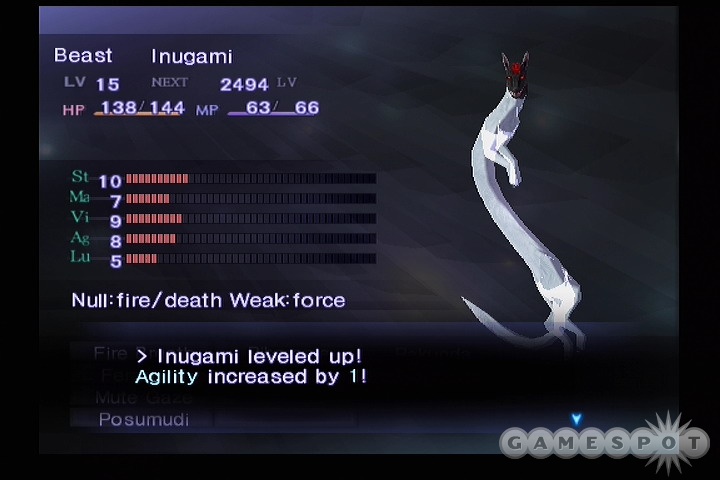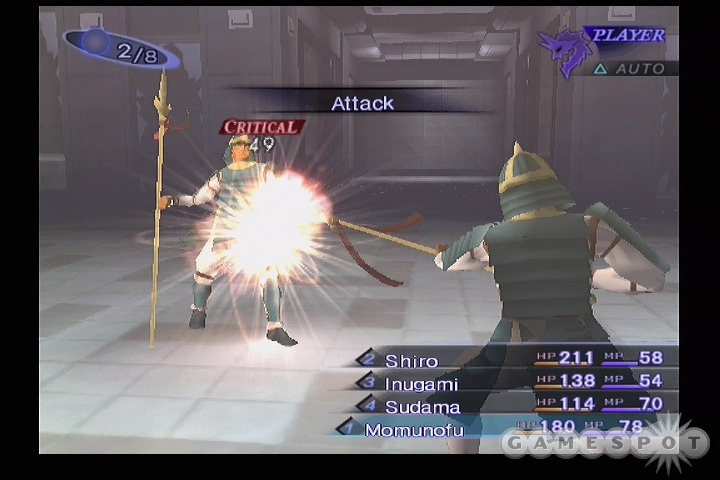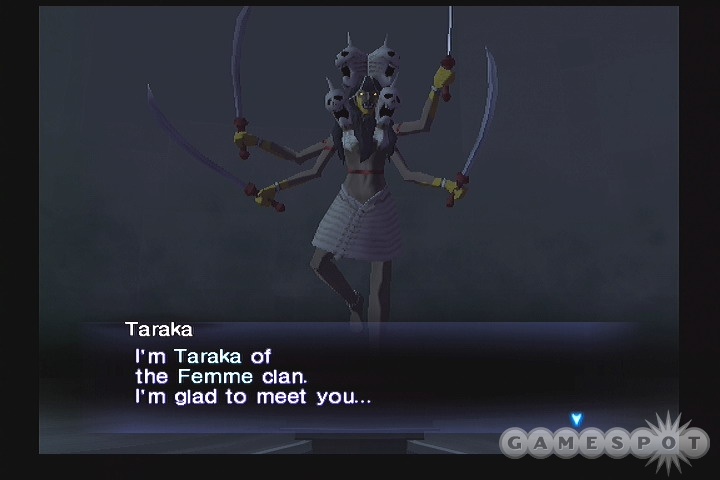The Shin Megami Tensei, or "MegaTen," series has been a popular and fruitful one in Japan, but Shin Megami Tensei: Nocturne is the first official MegaTen game that's made its way from Japan to North America. The series and its various spin-off properties (like the Persona games for the PlayStation) predominately feature tales of modern-day Tokyo beset by mysterious occult forces that unleash demonic entities to seriously disturb the natural order of things, eschewing traditional fantasy or sci-fi storytelling and simply bringing hell to your front door. This premise sets Nocturne apart in the world of console role-playing games, but the game isn't just unique in that regard--it offers a recruitment system that lets virtually any enemy you meet fight at your side and provides both strategic depth and a stiff challenge. Nocturne ensures that you earn each of your victories, and though some aspects of the game are a bit unforgiving, successfully besting the hordes of demons and punishing bosses you'll come across while unraveling the dark story is in the end a very rewarding experience.

So, just what is the story with Tokyo this time around? You start out as an ordinary Japanese high-school student (you'll have to name him yourself) who's on his way to meet up with a couple of his friends and visit a teacher who's been sick in the hospital. As you move through town, you'll happen upon news of two cults violently clashing in one of the city's parks. The park itself has been sealed off, but a sharply dressed man notes your interest and hands you an occult magazine that details a doomsday prophecy for the city. When you arrive at the hospital, you find your friends, but the hospital itself is mysteriously deserted. What happens next is usually what happens at the end of a conventional RPG: You finally locate your teacher, who tells you that she's part of a ceremony that will see all of Tokyo outside the hospital completely destroyed. Shortly after you find this out, she proceeds to destroy the city. So much for saving the world--this game bypasses all that nonsense. Instead, Nocturne poses the following situation to you: "OK, the world has been destroyed. What do you do now?"
A chance encounter with a young child and his nursemaid puts a further twist on things, as your character gets turned into a demon version of himself, complete with patterned skin and newfound powers. You're in good company, though, as what was Tokyo has turned into a haven for wandering demons and deities, now that all those pesky humans have been obliterated. The city has also collapsed upon itself into a sphere, and in the very center of the sphere is a glowing moon that the demons call Kagutsuchi. Kagutsuchi waxes and wanes much like any moon would, and the phases of this supernatural orb have a direct effect on the demons in the game, including on how they respond to you. Your fellow demons in Nocturne are pretty talkative, actually, and not just outside of battle. And that's a good thing, because as a fledgling demon in this new world, you need to get yourself some allies--and recruiting them during battle is the way to do it.
When you enter one of the game's many random encounters, you have a standard suite of battle options: a melee attack, some magic attacks, and some special abilities. You also have a "talk" option, which lets you attempt to start a conversation with, and hopefully recruit, one of your monstrous foes. It's not just a matter of asking, however, as demons tend to be a greedy lot. Many times they will ask you for money, or certain items, or even some of your health before they will agree to join. Some will turn up their nose at you altogether if you're not high enough in level, some don't understand what you're trying to say, and if Kagutsuchi is full, they won't pay any attention to you at all, as they'll be driven to distraction by the moon's energies. Even if you get a conversation going, there's no guarantee the demon will join up with you. Some will milk you for currency and items and then decide they'd rather not go, and others will just give you a choice piece of information or a nice item for your trouble. Occasionally, rather than make material demands, your would-be companion will ask you a philosophical question about power or happiness that you must answer correctly.

It sounds complicated, but the various outcomes balance well, and cajoling the demons you encounter and trying to sweet-talk them into joining your entourage becomes a compelling pastime and not just a required one. It's not all one-sided either, because every so often a demon will approach you to ask if you might have a spare item, or just to have a chat. Sometimes weakened enemies will beg for their lives, offering you items, money, or even their servitude in exchange for ensuring their safety. While the number of demons you can have as part of your retinue (counting the three you can bring into battle with you) is capped, you can help make the most out of your newfound friends and free up some space by using the game's fusion system.
Demon fusion can happen only at special shrines located throughout the world, and it's simply a matter of taking two of your party members and combining them to create a new monster. If you do this effectively, you'll often get a more-powerful demon of a higher level, and the fusion screen actually shows you what monster and level you'll get before you combine, so there's almost no guesswork to it. (Fusions can go awry, but it's not common.) You can use this technique to create some powerhouse creatures that you might not have seen in the field, and what's more, fusion monsters also get some of the original abilities of their "parents," so you can whip up creatures with some custom abilities. It's a fast and fun way to quickly upgrade the abilities of your party, and you'll need the assistance, because the battles in Nocturne can be tough.
The game's battles are tough, to a large extent, because of character affinities. Each of the demons in the game, including your own character, has certain elemental affinities and susceptibilities. Your main character can equip an item called a magatama that will change his elemental specialty. It's handy to be able to swap these out on the fly, but your friends do not have this ability. An affinity for fire might curtail the effect of an enemy fire attack, nullify it, or even let the demon absorb the attack as health points. Elemental weaknesses mean you and your allies will take extra damage from that particular kind of magic, be it ice, electric, or status ailments. Enter into the mix Nocturne's turn-based battle system, in which you and your enemies move as a team. So, your four characters will all have turns, and then the enemies will all have turns, and it will trade off. However, if you miss an attack, or cast a type of magic that ends up being absorbed by one or more enemies, you lose some of your characters' turns. So what was a four-character attack can suddenly become two. Likewise, if you score critical hits or major magic damage, you can get an extra turn or two.

Fortune shifts both ways, but the result is that if you field a number of characters with the same elemental affinity and you wind up getting hit by monsters you're vulnerable to, the damage piles up fast. Attacks that do critical damage, coupled with extra enemy turns, can make things turn ugly quickly. Bosses are particularly ruthless in this regard, as they often have powerful magic and special attacks, and they love to chain them together for big losses to your party. Not only that, but if your main character dies, it's game over. This isn't a game where you can field whomever you like, level them up, and expect to plow through everything. Nocturne doesn't allow you to be lazy about character selection, it doesn't allow you to be sloppy about attack selection (not when whiffed attacks mean missed turns), and it doesn't allow you to be nonchalant about character death.
Of course, this isn't really a bad thing--the game rewards skill, a good distribution of demons in your group, and strategy. The only issue with it is that you cannot be expected to know, when first entering an area, what kind of enemies you'll be up against and what they'll be throwing at you. So you'll probably have to work through a bit of trial and error (not necessarily involving wholesale death) as you proceed through the game and encounter various types of foes. You will certainly be forced to do this for boss battles, however, as you cannot run from them, and a hole in your defenses can put you out quickly. You can expect to try fighting certain bosses multiple times until you get your tactics and your party members sorted out, and that will inevitably bog down your progress at times. Still, the game isn't terribly unfair about it--the modular nature of your lead character and the wide range of often readily available demons lets you alter your party and play style without too much effort.
This version of the game is actually a special edition of the original, and it features a few additions in the way of side quests, dungeons, and a bonus character whom you'll likely recognize: Dante, from Capcom's Devil May Cry series. As a demon hunter in a world full of demons, Dante isn't too terribly out of place. He'll lock horns with your character on a few occasions, and you can even hire him into your party if you so desire, though it's inconsequential to the main storyline. Depending on the characters you align with and the choices that you make during the game, you can earn one of several endings that determine the ultimate fate of the ruined Tokyo and the lost souls within it. What with the length of the main game, an extra dungeon, the various magatamas you can collect, and all the allies you can meet and create, you can easily spend more than 40 hours on this game. It even has two difficulty settings, and while normal is challenging enough, the difficult setting should prove a hard test for even veterans of console RPGs.
At least there's no shortage of eye candy along the way: Nocturne sports the imaginative gothic-inspired art of Kazuma Kaneko, whose talent for clean and interesting character design comes through very well in 3D. You're always looking at an interesting character, be it your boldly tattooed hero, an animated demon mop, an angel arranged in bondage gear, or a ghostly demon dog with the length and shape of a Chinese dragon. All the characters have a very slick, well-made look to them, as well as a balance that makes them look almost realistic--they may be outrageously designed, but they all fit perfectly into their world. The indoor environments aren't all as nice. The indoor shopping malls and tunnels tend to be far simpler and less detailed, but there are also a number of temples, towers, dungeons, and other areas that feature flows of demonic energy, blood splatters, and other such touches. The outdoor environments are more subtle, interspersing scattered portions of ill-fated Tokyo with vast tracts of desert, huge black crevasses, and misshapen geometry to create a simple but great representation of a shattered world.

The game's soundtrack is as eclectic as its visual style, serving up hard rock, light jazz, bass-heavy techno, and traditional Japanese music, and all the tracks establish a great setting for the insane goings-on. The demons also have their own distinct vocalizations they'll make during battle--fairies will coo, small demons will trill, a horselike creature will neigh, a lionlike creature will roar--lending them an extra dose of personality. In a break with recent RPG tradition, there is no voice acting in the game--all the dialogue is conveyed through text--so at least there are no badly acted lines. The written dialogue flows well, considering that it's all demon intrigue and abstract occult happenings.
The role-playing genre has its share of sword-wielding heroes and huge epic adventures set against the dark reaches of space, but it doesn't have nearly enough modern-day demon catastrophes. Shin Megami Tensei: Nocturne is a refreshing, challenging change of pace in a genre that all too often treads the same well-worn, well-loved territory. While the game's unconventional recruitment system and its level of difficulty might be off-putting to those who've been cutting their teeth on simpler fare, the overall experience Nocturne offers rewards the required investment quite well.



